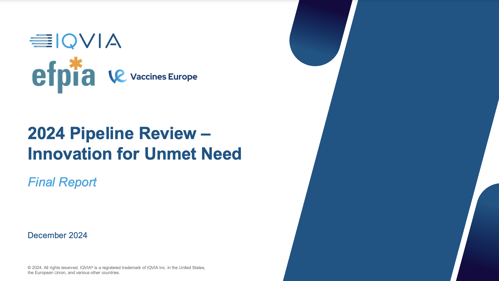Patients and society set to benefit from innovation which could “alleviate significant global disease burden”
The Pipeline review is an important reminder that many people continue to live with debilitating and life limiting disease, for whom new medicines could provide an essential lifeline. It is exciting to see the advances in science, and the diversity in innovation coming from pharmaceutical companies to address these health challenges.
EFPIA has today published its 2024 Pipeline Review – Innovation for unmet need. The report highlights a range of factors contributing to a major shift in the types of diseases impacting society. These include an aging population, climate change, lifestyle choices and antimicrobial resistance (AMR).
It shows that across the pipeline innovative advances in prevention and treatment are emerging that promise to alleviate a significant part of this disease burden, addressing the needs of patients and significantly improving patient care.
Conditions like cancer, cardiovascular disease, dementia and COPD are on the rise. The report estimates that around 20-30 million Europeans are suffering from a rare disease, while mental health conditions, including depression remain profound and multi-faceted. Patients living with these conditions need new treatments.
Data shows that to date [November 2024], the European Medicines Agency issued 97 new market authorisations, 56 of which are new active substances – a rise from 2023, which saw 77 market authorisations, and 39 new active substances.
Oncology remains the largest area for clinical research, accounting for almost a third of trials (29%). Cell and Gene Therapies (CaGT) also hold a significant share of overall trials, indicating strong investment in novel approaches to targeting cancer.
Trials initiated in 2023 for oncology indications continue to focus primarily on advanced or metastatic cancers, with high incidence cancers such as metastatic non-small cell lung cancer (NSCLC) & breast cancer particular focal points of clinical activity. Cancers with low survival rates such as pancreas and colorectal cancer are also an active area in clinical activity.
Cardiovascular, infectious disease and reproductive health therapy areas have also grown their respective share of the clinical trial pipeline between 2018 and 2023.
The report highlights several areas of innovation set to transform care for patients, they include:
Fighting Antimicrobial Resistance (AMR):
The report highlights the rise of AMR vaccines, with vaccines against Streptococcus pneumoniae a focal point, with 52 trials initiated since 2021. New vaccines can help prevent infections, reduce antibiotic usage and prolong the lifespan of novel antibiotics.
Novel antimicrobials are also needed to treat superbugs that are resistant to existing treatments, ensuring medical treatments and surgeries remain effective, and to fight the growing threat of AMR. However, the pipeline for new antimicrobials is fragile. Companies are increasingly facing financial struggles and experts are leaving the field. With only four antimicrobials in development that could be considered as innovative, a suite of strong incentives to reignite innovation and restore the pipeline are needed urgently.
Chronic viral infections have demonstrated a causal role in the onset of severe non-communicable diseases in patients, for example, Epstein-Barr virus (EBV) which is implicated in the development of multiple sclerosis and some cancers. There are currently three prophylactic vaccines in early-stage development for EBV, with the first approvals expected in the 2030’s. This would bring major benefits for people through reduced incidence of multiple sclerosis and EBV-associated cancers, as well as significantly reducing healthcare and societal costs. NCDs are responsible for 41m deaths globally each year.
mRNA vaccines – which came into focus during the pandemic - offer transformational personalised therapy for patients with cancer, by training the body’s immune system to destroy cancerous cells. 37 oncology trials have been initiated since 2022, 86% of which are in Phase 1. In colorectal cancer, there are three mRNA vaccines in phase 1 /2 trials, with the first approval expected in early 2030’s. They are set to offer patients a completely new treatment option, promising improved survival rates as well as minimising surgical procedures and associated complications.
Major Depressive Disorder (MDD) is a common mental health disorder, severely impacting quality of life and estimated to affect around 32million people in Europe. Several novel treatments for MDD are currently in development, many or which focus on improving neuroplasticity (aiding the brain to grow and heal). Clinical trial activity in MDD is high, with 248 trials initiated since 2019 in Europe.
Gene therapies are new treatments that replace defective or missing genes with the aim of curing life-long, debilitating diseases. The report shows that 175 clinical trials involving AAV-based gene therapies have been initiated since 2022, with neurology and neuromuscular indications a focus.
Several gene therapies for Duchenne Muscular Dystrophy (DMD) are aiming for approval in the next 5 years, holding the promise not only to alleviate symptoms but also to slow or stabilize disease progression for those living with the condition. DMD is a rare genetic disorder and the most severe form of muscular dystrophy, leading to progressive muscle degeneration and premature death.
The full EFPIA pipeline review can be found here.
Speaking about the report, Nathalie Moll, Director General, EFPIA, said:
“The Pipeline review is an important reminder that many people continue to live with debilitating and life limiting disease, for whom new medicines could provide an essential lifeline. It is exciting to see the advances in science, and the diversity in innovation coming from pharmaceutical companies to address these health challenges.
The investment we are seeing into new vaccines and treatments to tackle the health threats posed by AMR also brings hope; however, there is much more that we can achieve if EU policy makers work with us to incentivise more research and development in this vital area of unmet need.
Political instability and an ever-evolving disease burden means that now, more than ever, we must support Europe’s health security and its ability to innovate for patients. This can only be achieved through policies delivered through a coherent European life science strategy and a collaborative approach among all stakeholders.”
